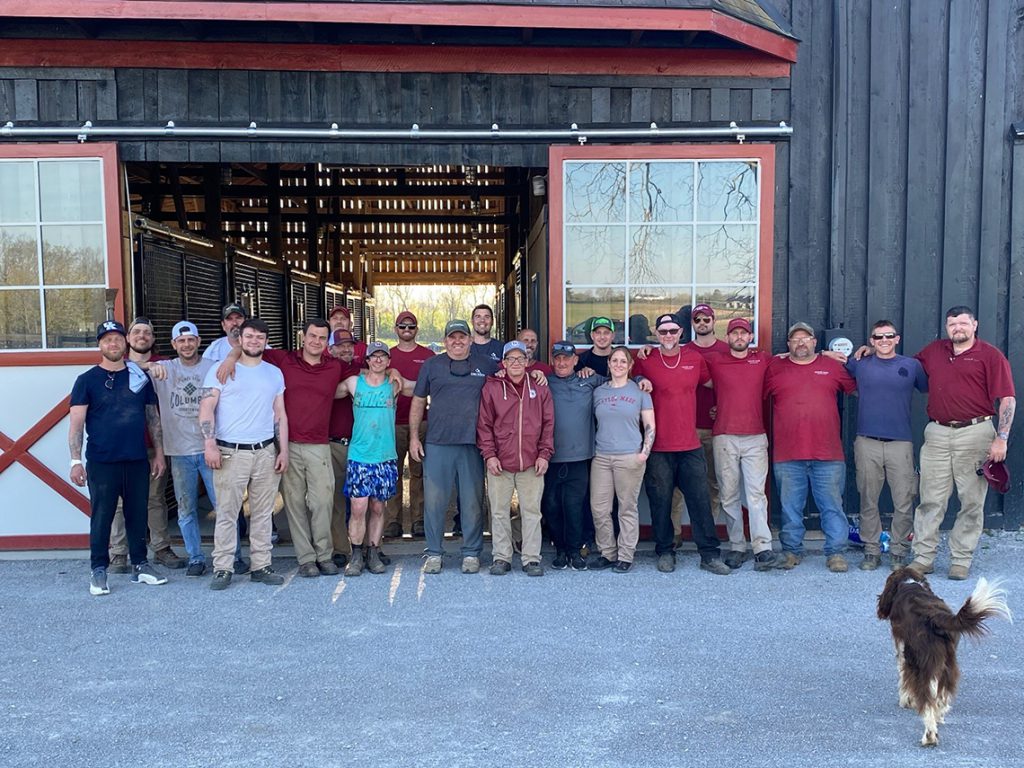Frank Taylor, the director of new business and development for Taylor Made, knew that there was an acute labor shortage in Kentucky, with farms unable to find reliable help. But Taylor thought he had a solution. Identify those who were struggling with substance abuse problems, put them into a recovery program and, when they are ready, teach them horsemanship skills that can make them candidates for jobs throughout the industry. Thus, Taylor created Stable Recovery, a rehabilitation program, and the Taylor Made School of Horsemanship.
What he didn't know at the time was whether or not farms would be willing to take a chance on individuals that had been in prison and/or struggled with drug addiction. He soon found out. His programs have been embraced in the Lexington area and several graduates have landed steady jobs and have moved on to meaningful lives.
Taylor joined this week's TDN Writers' Room podcast presented by Keeneland to talk about his programs and their many success stories. He was this week's Green Group Guest of the week.
Taylor said he arrived at the idea of starting the program when confronting his own alcoholism.
“Once I did it and quit, I started feeling better,” he said. “I was having more fun than I've ever had. It was that that kind of spurred me on to start the School of Horsemanship. It was going to be a 90-day program to teach the basics of horsemanship, to get people started off at, say, a groom level, either for Taylor Made or another farm. I had kind of a tough sales job. I went to my brothers and said, 'I've got this idea, I want to bring in a bunch of heroin addicts and alcoholics and felons in here to work with these horses.' They were looking at me like I had two heads. I just wanted a chance to make it work. They were reluctant because there were a lot of concerns. But here we are, 3 1/2 years into it. We have had a hiccup here or there, but not many. I really think we have changed a lot of lives. We've introduced a lot of people to the horse business and trained a lot of people. The results have been amazing.”
The program has been so successful that Taylor would like to expand, but, for now, it's a matter of one step at a time.
“If we wanted to have 500 people in this program by the end of the year, that wouldn't be a problem,” he said. “We need the space, money and management. The need for something like this is way beyond what we can serve at this point and always will be. It's just such a crisis and a terrible situation. It's destroying society, is destroying families. It's just absolutely one of the worst epidemics in the history of mankind. The beautiful thing is, is we have that huge problem and that we have a huge problem with labor in this country. If you blend those two together, they can help solve each other.”
It's been proven that working with horses can solve all kinds of problems for people, whether that be soldiers suffering from PTSD or individuals with drug issues. Taylor knows that the horses deserve a lot of the credit for the success of these programs.
“The horses, they are like the secret sauce for stable recovery,” Taylor said. “That's something we have that other recovery places don't have. I was born into the horse business and I love horses and they're my passion. But I didn't really realize how therapeutic horses were or understand that part of it until I started seeing people that are broken interacting with those horses and seeing the peace and joy that comes to them immediately. It's just an amazing thing.”
In the stallion spotlight segments, the podcast featured Coolmore's Corniche, who stands for just $15,000. The focus was also on Improbable, who stands at WinStar Farm for a fee of $15,000.
Elsewhere on the podcast, which is also sponsored by the Kentucky Thoroughbred Association, Coolmore, the Pennsylvania Horse Breeders Association,https://www.kentuckybred.org/https://www.nyrabets.com/ 1/ST Racing, West Point Thoroughbreds, https://www.winstarfarm.com/and XBTV.com, the team of Randy Moss, Bill Finley and Zoe Cadman delved back into the Bob Baffert ban at Churchill Downs, which also extends to the GI Kentucky Oaks, which means the impressive winner of the GIII Las Virgenes S. Kinza (Carpe Diem) will be shut out. Moss agreed that the Derby week races might deserve an asterisk if Baffert's horses are all banned, but he argued that it's not too late for Churchill to change its mind and to lift the Baffert ban. The team took a look at the GII Risen Star S., to be run this Saturday at the Fair Grounds and all agreed it will be by far the deepest Derby prep run so far this year.
For the podcast video, click here. For audio only, click here.
The post Frank Taylor Joins TDN Writers’ Room Podcast appeared first on TDN | Thoroughbred Daily News | Horse Racing News, Results and Video | Thoroughbred Breeding and Auctions.

